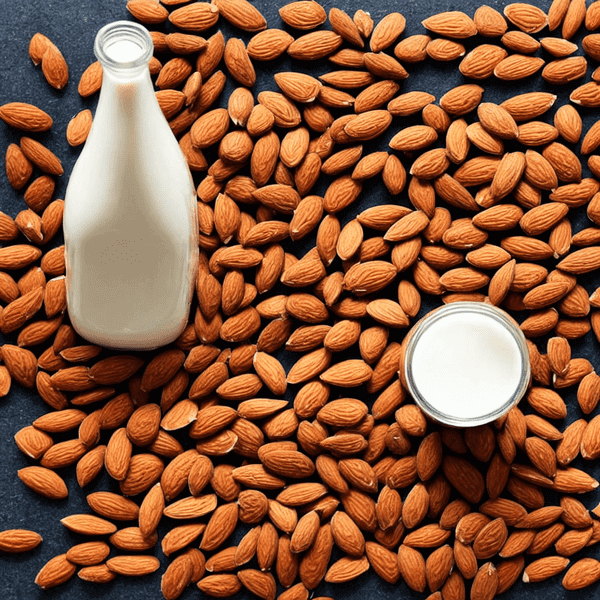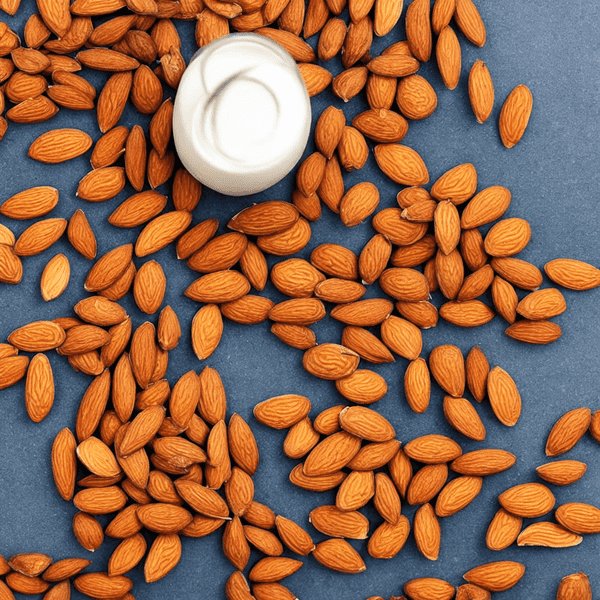If you fall into the category of contemporary health aficionados, then it’s probable that intermittent fasting has made it onto your roster of dietary practices to explore.
But with so many questions about what plants and food types break a fast, it can take time to know precisely when you should indulge and abstain.
One of the most frequently and commonly asked questions is whether almond milk breaks a fast; in this article, we’ll uncover the answer to this question and give helpful tips for optimizing your diet while fasting.
Will Almond Milk Break A Fast?
The short answer is yes. Almond milk does contain calories, so it won’t be ideal for those that are looking to utilize the health benefits of intermittent fasting methods, such as weight loss, reduced inflammation, blood sugar management and improved insulin sensitivity.
You’ll need to find other sources of hydration if you want to keep your fasts pure.

That said, not all types of almond milk found in grocery store are created equal. If you’re looking to add some flavor or creaminess to your fasting experience, there are some low-calorie versions of almond milk that will keep your fast.
Unsweetened almond milk often contains less than 20 calories per cup and can be a great way to get some extra hydration and flavor into your fasts.
Does Almond Milk Spike Insulin?
When it comes to diet and fasting, many people worry about how foods can affect their insulin levels. Fortunately, almond milk is relatively low in sugar and doesn’t cause a significant spike in insulin (main storing hormone).
This means that you can enjoy almond milk without worrying about compromising your fasts or hindering your health goals.
It’s important to note that not all almond milks are the same. Some brands add sugar and other sweeteners to their products which can cause a spike in insulin levels. Make sure to read labels carefully before adding almond milk to your diet when fasting.
Does Almond Milk Break Ketosis?
If you’re following a ketogenic diet and wondering if almond milk will break your fast, the answer is yes. As mentioned above, almond milk does contain calories, so it won’t help you maintain a state of ketosis. If you’re trying to reach or remain in ketosis, then it’s best to avoid consuming almond milk.
Does Almond Milk Break Intermittent Fast?
Intermittent fasting requires you to abstain from all foods and drinks with calories for a set period of time. As almond milk does contain calories, it will break your fast. If you’re looking to enjoy the health benefits of fasting, then avoid consuming any calorie-containing beverage, including almond milk.
Is Almond Milk Allowed On Daniel Fast?
Almond milk is a common dairy-free milk alternative that many people enjoy.
Whether it’s allowed on the Daniel Fast depends upon the individual following the fast and their own interpretations of it. The basic tenets of the Daniel Fast are outlined in the Bible, but interpretations may vary on details like whether or not almond milk is appropriate.
Some practitioners believe that plant-based kinds of milk, such as almond milk, should be permitted in moderation as long as they do not contain additional sweeteners or additives that may go against the spirit of the fast.
Ultimately, it is intended to be a time for spiritual growth rather than deprivation, so any food restrictions should be chosen thoughtfully and with respect for one’s brain health and overall well-being.
How Much Almond Milk Can I Drink Without Breaking A Fast?
When it comes to breaking fast, consuming almond milk can be a tricky subject. Regulated meal plans tend to preclude most milk products, but certain kinds – such as almond milk – are deemed acceptable.
Generally speaking, one cup of unsweetened almond milk is the limit when it comes to fasting. It is always important to remember that only plain and unsweetened varieties of almond milk should be consumed during a fast for the best results.
Moreover, this kind of milk has several health benefits due to its low-calorie content and lack of saturated fats – however, since it does contain some carbohydrates, consuming more than one cup can have an undesired effect on bodily functions and your fasting process.
Does Unsweetened Almond Milk Break A Fast?
When it comes to fasting, one of the main components is not consuming food or drinks that contain calories. Many people turn to unsweetened almond milk for sustenance and nourishment when abstaining from other substances.
Whether or not it breaks a fast has been the cause of much debate, but ultimately it comes down to the individual’s goals.

If someone is following a strict fast where they are not consuming any calories, then unsweetened almond milk should be avoided; however, if you are doing an intermittent fast or a more lenient diet, then almond milk may provide some nutrients without compromising your end goal.
Ultimately, it’s up to you to decide whether or not unsweetened almond milk fits within your fasting regimen and lifestyle.
Does Unsweetened Almond Milk Spike Insulin?
Almond milk sure is a popular dairy-free alternative that many people use to replace cow’s milk in their diets. Unsweetened almond milk is generally considered to be healthier than other sweetened varieties due to its low calorie and carbohydrate content.
Because unsweetened almond milk contains very few carbohydrates, it does not cause a significant spike in insulin levels. Furthermore, it is a good source of healthy fats and other vitamins and minerals, making it an excellent choice for those with diabetes or who are looking to maintain their blood sugar levels.
Does Unsweetened Almond Milk Break Ketosis?
Unsweetened almond milk is generally considered to be compatible with the ketogenic diet. As it contains very few carbs, it will not break your state of ketosis and can provide additional nutrition without disrupting your progress.
Additionally, unsweetened almond milk is a great source of healthy fats, vitamins, minerals, and other essential nutrients. This makes it an ideal choice for those looking to get additional nutrition while on the ketogenic diet.
Can I Put Almond Milk In Coffee While Fasting?
Whether or not you can put almond milk in your coffee or tea while fasting depends on the type of fast that you are doing.
If you’re following an intermittent fasting schedule, adding a splash of unsweetened almond milk to your morning cup of coffee should be fine as long as it does not contain added sugars or other sweeteners.
Is Almond Milk In Coffee OK When Intermittent Fasting?
Yes, you can put almond milk in your morning coffee or tea when intermittent fasting. However, it is important to select an unsweetened variety of almond milk and avoid adding any additional sweeteners or other ingredients that may disrupt your fast.
Additionally, be mindful of how much almond milk you are using, as consuming too much can lead to unwanted calorie intake.
Overall, unsweetened almond milk can be a beneficial addition to your intermittent fasting routine if consumed in moderation.
Does Oat Milk Break A Fast?
Oat milk is generally considered to be compatible with most fasting regimens. As it contains fewer calories than other dairy-free alternatives, such as almond or soy milk, and does not contain any added sugars or sweeteners, it is usually considered suitable for fasting.
However, it is important to keep note that oat milk does contain carbohydrates, which may affect your blood sugar levels and interrupt the fasting process. Therefore, it is important to assess how oat milk affects your body before incorporating it into your fast.
Ultimately, whether or not oat milk breaks a fast depends on one’s individual goals and needs. It is best to speak with a doctor or nutritionist to determine whether or not oat milk is suitable for your particular fasting regimen.
Does Oat Milk Break Intermittent Fasting?
Oat milk is suitable for intermittent fasting because it meets the basic requirements of an IF diet: no calories and low sugar or carbohydrates. It is also a good source of protein and dietary fiber, which can help you feel full and satisfied during fasting periods.
Oat milk contains some natural sugars, but not enough to break your fast.
Additionally, it is a good source of vitamins and minerals, such as calcium, potassium, vitamin D, and magnesium. These nutrients can provide you with the energy needed for your body to function optimally during fasting periods.

Overall, oat milk is a great option for those looking to include some nutrition and flavor into their IF diet. It is ideal for the morning protein shake, smoothie, or cup of coffee that is often enjoyed during IF.
In order to maximize the benefits and avoid breaking your fast, make sure you opt for unsweetened oat milk with no added sugars. This will guarantee that your intermittent fasting remains intact and you get all the health benefits associated with it.
Does Oat Milk Spike Blood Sugar?
Oat milk does contain natural sugars and, therefore, can potentially spike blood sugar levels. Additionally, oat milk also contains some carbohydrates, which could affect blood sugar. Therefore, it is important to monitor your body’s response when consuming oat milk to determine how it affects your blood sugar.
If you have any concerns about the impact of oat milk on your blood sugar, it is best to consult a healthcare professional before adding it to your diet. They can provide personalized advice and help you figure out the best way to include oat milk in your routine while maintaining healthy blood sugar levels.

Overall, oat milk can be beneficial to a ketogenic diet or intermittent fasting regimen if consumed in moderation. As long as you select an unsweetened variety and monitor your body’s response, you should be able to enjoy the health benefits of oat milk without causing any spikes in your blood sugar levels.
As with any dietary change, it is important to consult a healthcare professional before making adjustments to your diet. They can help ensure that the changes you make are beneficial and will help you reach your health goals.
Is Oat Milk Allowed On Daniel Fast?
The Daniel Fast is a religious diet that involves eliminating all animal products, including dairy. Oat milk is not allowed on the Daniel Fast as it does contain some natural sugars and carbohydrates.
However, if you are looking for a dairy-free alternative to enjoy during your fast, there are other plant-based kinds of milk available that do not contain any added sugars and are suitable for the fast.
These include almond milk, cashew milk, nut milk, and hemp milk.
Ultimately, it is best to consult a nutritionist or your religious advisor to determine what foods are acceptable during a Daniel Fast.
They can provide you with personalized guidance to ensure that you adhere to the strict guidelines of the diet while still getting the nutrition you need.
Does Consuming Cocoa during a Fast Break the Fast?
Consuming cocoa during a fast: does cacao break a fast? This question arises due to its caloric content. An ideal fast involves abstaining from all caloric intake. While cocoa does contain some calories, the average amount is relatively low. However, to maintain the spiritual, mental, or physical benefits of fasting, it is best to avoid consuming cocoa or any other calorie-containing substance.
The Bottom Line
While almond milk does contain some carbohydrates, it is a low enough amount that it will not break a fast. Unsweetened versions of almond milk are an especially good choice for those looking to keep their fasting window as long as possible.
Oat milk is another type of plant-based “milk” that can be consumed during a fast, but because it contains more carbohydrates than almond milk, oat milk may cause some people to feel hungry sooner.
Ultimately, the best type of “milk” to drink while fasting is whichever one you personally find the easiest to stick with and helps you reach your goals.
